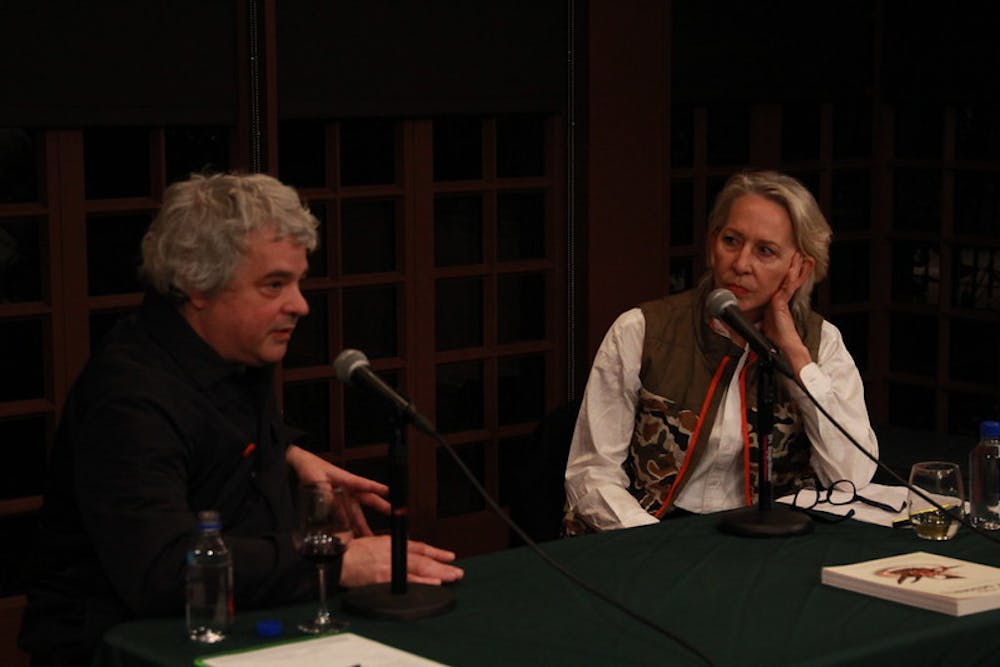It’s a cold, late October evening as I hurry into the Kelly Writers House to catch the first of "Chef to Chef": a series of conversations between American chef, author, and Penn lecturer Gabrielle Hamilton and several prominent and interesting figures in the industry. Tonight, it’s Brooks Headley, former executive pastry chef at Michelin star restaurant Del Posto and owner of the vegetarian burger joint Superiority Burger, both located in New York City. The introductions are just being passed around as I slide into a bench. From where I’m seated, I can see Hamilton and Headley settled at the front, sipping glasses of wine and exchanging opening remarks with KWH Faculty Director Al Filreis.
“There would be no foam and no ‘conceptual’ or ‘intellectual’ food; just the salty, sweet, starchy, brothy, crispy things that one craves when one is actually hungry,” Filreis quotes from Hamilton’s cookbook, Prune. “How does this disposition fit here at the Writers House, and why does it inspire me, as the Faculty Director, to engage Gabrielle in a series of talking about food in a house for writers?” he asks. “Because that is the idea about words that we want to promulgate. Words are closer to things like food than they are to ideas, things.”
With that, Hamilton and Headley launch into their conversation. It’s organic and feels much less like a panel than it is a catch–up between two old friends: talking about words, food, and the restaurant industry. “I remember meeting you, I'm sorry to say, approximately 25 years ago,” Hamilton begins. “I'm not sorry to say, but I think that we've known each other for 25 years, even though none of us look a day over 31.” The crowd erupts in laughter.
“I think I met you in the fluorescent–lit basement of a huge hotel in Washington, D.C., at a benefit for Heart's Delight, American Heart Association, I think, huge outfit,” Hamilton reminisces, referencing their shared experience catering at a fundraising event. “You're in a corner with huge vats of ice, pouring chocolate into vats of ice water, ice cubes, ice water, which ended up being on your station, these un–frickin’–real coral reefs of chocolate … and there were, like, toasted bread crumbs with olive oil, and it was the most unbelievable thing I'd ever seen.”
They talk about their experiences as chefs, discussing Headley’s professional career spanning from office worker and punk rock drummer to Michelin–starred pastry chef and restaurateur. “I found an ad in the Washington City Paper that just had, ‘pastry assistant wanted.' And I wrote—I just graduated with a writing degree—so I wrote them, and I wore a suit [to the interview],” Headley recalls. "No one’s done that, like, ever. I think they hired me as a joke.”
“They called you Mr. Suit at the meeting,” Hamilton adds.
Headley likens his time as a pastry chef at Del Posto to being part of a band: "That's the only time when I was able to make a connection between being in a band and making food, because with dessert … everything has eggs, everything has butter, everything has flour, everything has sugar, and everything has salt. It's all the same ingredients, but you're making a bunch of different things with these six [ingredients].”
Hamilton dedicates a brief tangent to a particularly witty panna cotta she remembers being served at Del Posto, deliberately shaped atop the lid of a to–go container—“this, like, flat, perfect disc of a panna cotta.” “And I was like, who is this dude?” she teases. Then, the conversation drifts to Headley’s transition from pastry chef to owner of Superiority Burger, a much less exclusive but equally popular establishment.
“It felt weird to me, because all of a sudden, I had this job that I loved [at Del Posto], but the entire job was catering to, like, the richest people, and in D.C., those were lawyers, lobbyists and politicians. And it really rubbed me the wrong way,” Headley says.
The colleagues also speak on the more sobering sides of their profession and the impact of COVID–19 on the restaurant industry. “There was a point where my whole thing was that I was going to use the same ingredients that the really expensive restaurant used, but then sell everything for five dollars,” Headley says. “And that somehow lasted for five years, up to COVID, and then COVID basically destroyed the restaurant because it was too small.”
To that, Hamilton highlights the ethical dilemma of pricing in the hospitality industry. “When we falsely price our material, we educate the public to undervalue what we do, right?”
The conversation winds down with a series of questions from the audience. Somebody asks how the two chefs reckon with using words to tell stories about food when so much of the kitchen labor industry isn’t native English–speaking. Another asks about the ideal distance between kitchen and customer—chef and diner. The responses fire up quickly and naturally from both Hamilton and Headley. “No foam,” I think to myself. Just the rich, hearty conversation that flows from two people who are hungry and love what they do.

